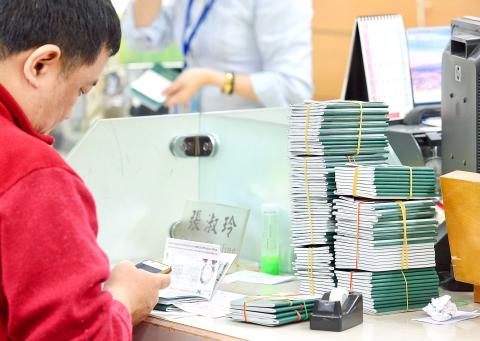There should be no technical obstacles to adding a third gender option to passports as long as the Ministry of the Interior approves such an option for household registration and national identification purposes, the Ministry of Foreign Affairs said yesterday.
The issuance of passports is conditional on the issuance of national identification cards, so if the interior ministry decides to include a third gender option, the foreign ministry would make the same change to passports, foreign ministry spokesman Andrew Lee (李憲章) said at a news conference.
Several countries have introduced an “X” — “unspecified” — gender option on passports, including Canada, Australia, New Zealand, Malta, Nepal and Denmark, according to the International Civil Aviation Organization (ICAO).

Photo: Peter Lo, Taipei Times
If the government were to make new policy on the matter, the Department of Household Registration would make changes as required, department Director Chang Wan-yi (張琬宜) said.
The Executive Yuan’s Gender Equality Committee yesterday said it is working to introduce a third gender option on identity documents to protect the rights of transgender, intersex and other gender-diverse individuals.
The government has decided to add a third gender option, the committee said, adding that it is checking related laws, regulations and forms and would convene a cross-agency meeting to discuss specifics as soon as possible.
The policy involves several agencies and the committee predicts that multiple discussions would need to be held, it said.
In September last year, Minister Without Portfolio Lin Wan-I (林萬億) convened a meeting and instructed agencies to check laws, regulations and forms, the committee said.
Minister without Portfolio Lo Ping-cheng (羅秉成) is now responsible for supervising the preparatory work, it said.
After the examination, Lo is to convene a cross-agency meeting to discuss specifics and the short, medium and long-term goals of the policy, it added.
Further discussions are needed to decide on a timetable for the policy, the committee said.

US President Donald Trump said "it’s up to" Chinese President Xi Jinping (習近平) what China does on Taiwan, but that he would be "very unhappy" with a change in the "status quo," the New York Times said in an interview published yesterday. Xi "considers it to be a part of China, and that’s up to him what he’s going to be doing," Trump told the newspaper on Wednesday. "But I’ve expressed to him that I would be very unhappy if he did that, and I don’t think he’ll do that," he added. "I hope he doesn’t do that." Trump made the comments in

NOT AN OPENING: Trump’s violation of international law does not affect China’s consideration in attacking Taiwan; Beijing lacks capability, not precedent, an official said Taiwanese officials see the US’ capture of the president of Venezuela as a powerful deterrent to Beijing’s aggression and a timely reminder of the US’ ability to defeat militaries equipped with Chinese-made weapons. The strikes that toppled Venezuelan President Nicolas Maduro signaled to authoritarian leaders, including Chinese President Xi Jinping (習近平), US President Donald Trump’s willingness to use military might for international affairs core to US interests, one senior official in Taipei’s security circle said. That reassured Taiwan, the person said. Taipei has also dismissed the idea that Trump’s apparent violation of international law could embolden Beijing, said the official, who was not

A cold surge advisory was today issued for 18 cities and counties across Taiwan, with temperatures of below 10°C forecast during the day and into tonight, the Central Weather Administration (CWA) said. New Taipei City, Taipei, Taoyuan and Hsinchu, Miaoli and Yilan counties are expected to experience sustained temperatures of 10°C or lower, the CWA said. Temperatures are likely to temporarily drop below 10°C in most other areas, except Taitung, Pingtung, Penghu and Lienchiang (Matsu) counties, CWA data showed. The cold weather is being caused by a strong continental cold air mass, combined with radiative cooling, a process in which heat escapes from

Snow this morning fell on Alishan for the first time in seven years, as a strong continental cold air mass sent temperatures plunging across Taiwan, the Central Weather Administration (CWA) said. The Alishan weather station, located at an elevation of about 2,200m in central Taiwan, recorded snowfall from 8:55am to 9:15am, when the temperature dropped to about 1°C, the CWA said. With increased moisture and low temperatures in the high-altitude Alishan area, the conditions were favorable for snow, CWA forecaster Tsai Yi-chi (蔡伊其) said. The last time snow fell at the Alishan weather station was on Jan. 10, 2018, while graupel fell there